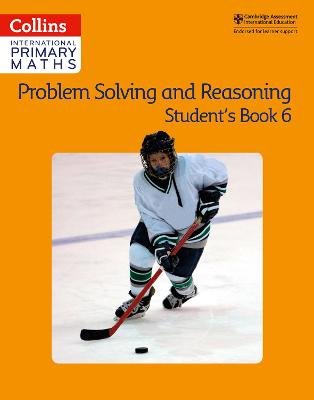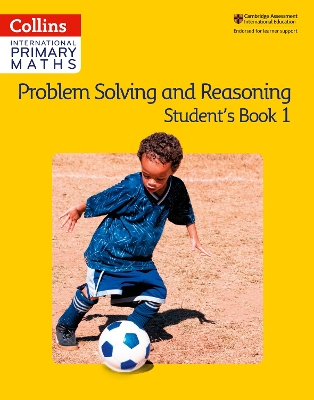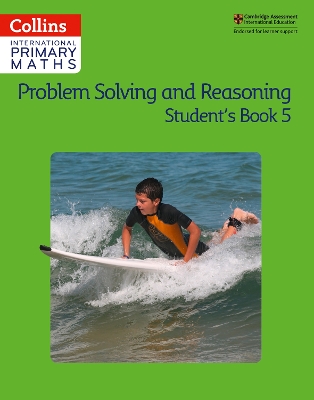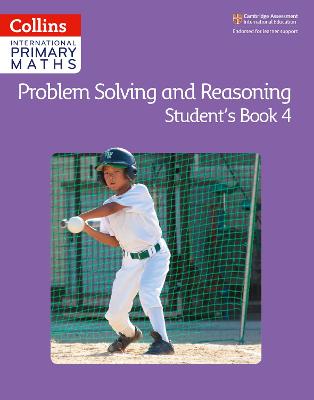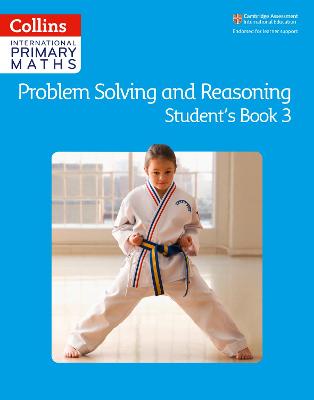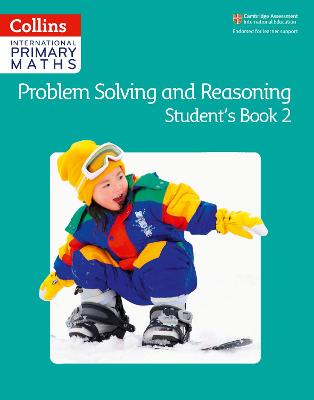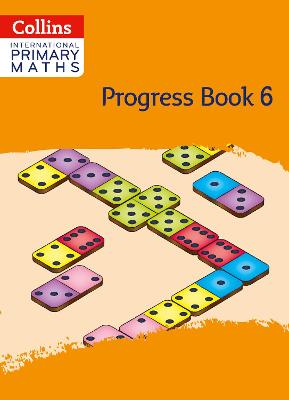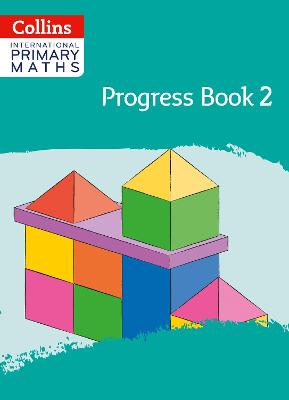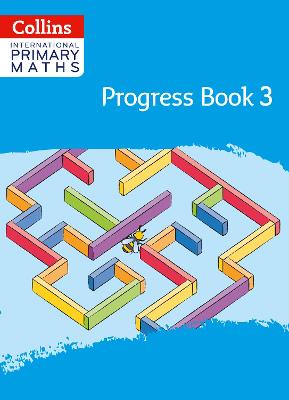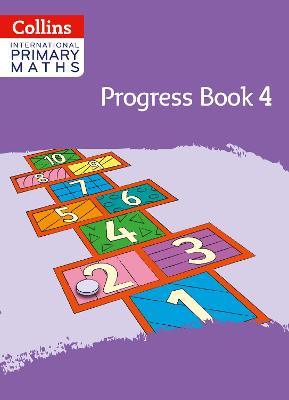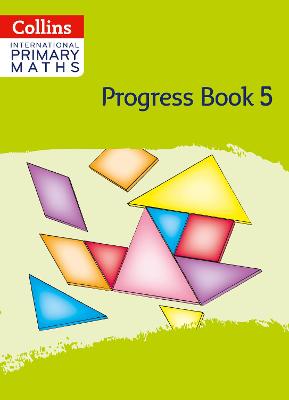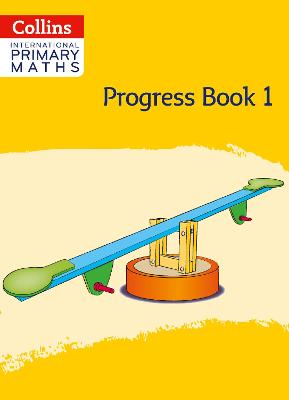Collins International Primary Maths
18 total works
Students can quickly get to grips with problem solving and reasoning by completing activities categorised by topic and question type. Fully in line with the Cambridge Primary Mathematics Curriculum.
Problem solving and reasoning are focuses in the Cambridge Primary Mathematics Curriculum. It is essential that all students have access to problem solving and reasoning activities. Some key benefits to problem solving in maths include:
* Helping pupils grasp diverse mathematical concepts and understand the application of the subject
* Enhancing strategic thinking
* Developing transferable skills
This book consists of three different types of mathematical problem solving challenges:
1. Solving mathematical problems. This involves pupils solving problems 'within' mathematics itself, recognising patterns and relationships, making conjectures and generalisations, and explaining and justifying conclusions.
2. Reasoning mathematically. This involved pupils using logical thinking to solve problems, focusing on making conjectures and generalisations, and explaining and justifying conclusions using appropriate language.
3. Using & applying mathematics in real-world contexts. This involves pupils engaging in challenges that require them to use and apply their mathematical knowledge and skills in open-ended, real-world contexts.
Students can quickly get to grips with problem solving and reasoning by completing activities categorised by topic and question type. Fully in line with the Cambridge Primary Mathematics Curriculum.
Problem solving and reasoning are focuses in the Cambridge Primary Mathematics Curriculum. It is essential that all students have access to problem solving and reasoning activities. Some key benefits to problem solving in maths include:
* Helping pupils grasp diverse mathematical concepts and understand the application of the subject
* Enhancing strategic thinking
* Developing transferable skills
This book consists of three different types of mathematical problem solving challenges:
1. Solving mathematical problems. This involves pupils solving problems 'within' mathematics itself, recognising patterns and relationships, making conjectures and generalisations, and explaining and justifying conclusions.
2. Reasoning mathematically. This involved pupils using logical thinking to solve problems, focusing on making conjectures and generalisations, and explaining and justifying conclusions using appropriate language.
3. Using & applying mathematics in real-world contexts. This involves pupils engaging in challenges that require them to use and apply their mathematical knowledge and skills in open-ended, real-world contexts.
Students can quickly get to grips with problem solving and reasoning by completing activities categorised by topic and question type. Fully in line with the Cambridge Primary Mathematics Curriculum.
Problem solving and reasoning are focuses in the Cambridge Primary Mathematics Curriculum. It is essential that all students have access to problem solving and reasoning activities. Some key benefits to problem solving in maths include:
* Helping pupils grasp diverse mathematical concepts and understand the application of the subject
* Enhancing strategic thinking
* Developing transferable skills
This book consists of three different types of mathematical problem solving challenges:
1. Solving mathematical problems. This involves pupils solving problems 'within' mathematics itself, recognising patterns and relationships, making conjectures and generalisations, and explaining and justifying conclusions.
2. Reasoning mathematically. This involved pupils using logical thinking to solve problems, focusing on making conjectures and generalisations, and explaining and justifying conclusions using appropriate language.
3. Using & applying mathematics in real-world contexts. This involves pupils engaging in challenges that require them to use and apply their mathematical knowledge and skills in open-ended, real-world contexts.
Students can quickly get to grips with problem solving and reasoning by completing activities categorised by topic and question type. Fully in line with the Cambridge Primary Mathematics Curriculum.
Problem solving and reasoning are focuses in the Cambridge Primary Mathematics Curriculum. It is essential that all students have access to problem solving and reasoning activities. Some key benefits to problem solving in maths include:
* Helping pupils grasp diverse mathematical concepts and understand the application of the subject
* Enhancing strategic thinking
* Developing transferable skills
This book consists of three different types of mathematical problem solving challenges:
1. Solving mathematical problems. This involves pupils solving problems 'within' mathematics itself, recognising patterns and relationships, making conjectures and generalisations, and explaining and justifying conclusions.
2. Reasoning mathematically. This involved pupils using logical thinking to solve problems, focusing on making conjectures and generalisations, and explaining and justifying conclusions using appropriate language.
3. Using & applying mathematics in real-world contexts. This involves pupils engaging in challenges that require them to use and apply their mathematical knowledge and skills in open-ended, real-world contexts.
Students can quickly get to grips with problem solving and reasoning by completing activities categorised by topic and question type. Fully in line with the Cambridge Primary Mathematics Curriculum.
Problem solving and reasoning are focuses in the Cambridge Primary Mathematics Curriculum. It is essential that all students have access to problem solving and reasoning activities. Some key benefits to problem solving in maths include:
* Helping pupils grasp diverse mathematical concepts and understand the application of the subject
* Enhancing strategic thinking
* Developing transferable skills
This book consists of three different types of mathematical problem solving challenges:
1. Solving mathematical problems. This involves pupils solving problems 'within' mathematics itself, recognising patterns and relationships, making conjectures and generalisations, and explaining and justifying conclusions.
2. Reasoning mathematically. This involved pupils using logical thinking to solve problems, focusing on making conjectures and generalisations, and explaining and justifying conclusions using appropriate language.
3. Using & applying mathematics in real-world contexts. This involves pupils engaging in challenges that require them to use and apply their mathematical knowledge and skills in open-ended, real-world contexts.
Students can quickly get to grips with problem solving and reasoning by completing activities categorised by topic and question type. Fully in line with the Cambridge Primary Mathematics Curriculum.
Problem solving and reasoning are focuses in the Cambridge Primary Mathematics Curriculum. It is essential that all students have access to problem solving and reasoning activities. Some key benefits to problem solving in maths include:
* Helping pupils grasp diverse mathematical concepts and understand the application of the subject
* Enhancing strategic thinking
* Developing transferable skills
This book consists of three different types of mathematical problem solving challenges:
1. Solving mathematical problems. This involves pupils solving problems 'within' mathematics itself, recognising patterns and relationships, making conjectures and generalisations, and explaining and justifying conclusions.
2. Reasoning mathematically. This involved pupils using logical thinking to solve problems, focusing on making conjectures and generalisations, and explaining and justifying conclusions using appropriate language.
3. Using & applying mathematics in real-world contexts. This involves pupils engaging in challenges that require them to use and apply their mathematical knowledge and skills in open-ended, real-world contexts.
Collins International Primary Maths supports best practice in primary maths teaching, whilst encouraging teacher professionalism and autonomy. A wealth of supporting digital assets are provided for every lesson, including slideshows, tools and games to ensure they are rich, lively and engaging.
Collins International Primary Maths supports best practice in primary maths teaching, whilst encouraging teacher professionalism and autonomy.
Each Progress Book page offers assessment questions which allow learners to apply what they have learned and demonstrate mastery and understanding of mathematical concepts. Questions throughout the course develop learners' Thinking and Working Mathematically skills and each unit offers an opportunity for personal reflection on progress.
Collins International Primary Maths supports best practice in primary maths teaching, whilst encouraging teacher professionalism and autonomy. A wealth of supporting digital assets are provided for every lesson, including slideshows, tools and games to ensure they are rich, lively and engaging.
Collins International Primary Maths supports best practice in primary maths teaching, whilst encouraging teacher professionalism and autonomy.
Each Progress Book page offers assessment questions which allow learners to apply what they have learned and demonstrate mastery and understanding of mathematical concepts. Questions throughout the course develop learners' Thinking and Working Mathematically skills and each unit offers an opportunity for personal reflection on progress.
Collins International Primary Maths supports best practice in primary maths teaching, whilst encouraging teacher professionalism and autonomy. A wealth of supporting digital assets are provided for every lesson, including slideshows, tools and games to ensure they are rich, lively and engaging.
Collins International Primary Maths supports best practice in primary maths teaching, whilst encouraging teacher professionalism and autonomy.
Each Progress Book page offers assessment questions which allow learners to apply what they have learned and demonstrate mastery and understanding of mathematical concepts. Questions throughout the course develop learners' Thinking and Working Mathematically skills and each unit offers an opportunity for personal reflection on progress.
Collins International Primary Maths supports best practice in primary maths teaching, whilst encouraging teacher professionalism and autonomy. A wealth of supporting digital assets are provided for every lesson, including slideshows, tools and games to ensure they are rich, lively and engaging.
Collins International Primary Maths supports best practice in primary maths teaching, whilst encouraging teacher professionalism and autonomy.
Each Progress Book page offers assessment questions which allow learners to apply what they have learned and demonstrate mastery and understanding of mathematical concepts. Questions throughout the course develop learners' Thinking and Working Mathematically skills and each unit offers an opportunity for personal reflection on progress.
Collins International Primary Maths supports best practice in primary maths teaching, whilst encouraging teacher professionalism and autonomy. A wealth of supporting digital assets are provided for every lesson, including slideshows, tools and games to ensure they are rich, lively and engaging.
Collins International Primary Maths supports best practice in primary maths teaching, whilst encouraging teacher professionalism and autonomy.
Each Progress Book page offers assessment questions which allow learners to apply what they have learned and demonstrate mastery and understanding of mathematical concepts. Questions throughout the course develop learners' Thinking and Working Mathematically skills and each unit offers an opportunity for personal reflection on progress.
Collins International Primary Maths supports best practice in primary maths teaching, whilst encouraging teacher professionalism and autonomy. A wealth of supporting digital assets are provided for every lesson, including slideshows, tools and games to ensure they are rich, lively and engaging.
Collins International Primary Maths supports best practice in primary maths teaching, whilst encouraging teacher professionalism and autonomy.
Each Progress Book page offers assessment questions which allow learners to apply what they have learned and demonstrate mastery and understanding of mathematical concepts. Questions throughout the course develop learners' Thinking and Working Mathematically skills and each unit offers an opportunity for personal reflection on progress.
International Primary Maths Progress Book Student’s Book: Stage 2
by Peter Clarke
Collins International Primary Maths supports best practice in primary maths teaching, whilst encouraging teacher professionalism and autonomy.
Each Progress Book page offers write-in assessment questions which allow learners to apply what they have learned and demonstrate mastery and understanding of mathematical concepts. Questions throughout the course develop learners’ Thinking and Working Mathematically skills and each unit offers an opportunity for personal reflection on progress.
International Primary Maths Progress Book Student’s Book: Stage 6
by Peter Clarke
Collins International Primary Maths supports best practice in primary maths teaching, whilst encouraging teacher professionalism and autonomy.
Each Progress Book page offers write-in assessment questions which allow learners to apply what they have learned and demonstrate mastery and understanding of mathematical concepts. Questions throughout the course develop learners’ Thinking and Working Mathematically skills and each unit offers an opportunity for personal reflection on progress.
International Primary Maths Progress Book Student’s Book: Stage 1
by Peter Clarke
Collins International Primary Maths supports best practice in primary maths teaching, whilst encouraging teacher professionalism and autonomy.
Each Progress Book page offers write-in assessment questions which allow learners to apply what they have learned and demonstrate mastery and understanding of mathematical concepts. Questions throughout the course develop learners’ Thinking and Working Mathematically skills and each unit offers an opportunity for personal reflection on progress.
International Primary Maths Progress Book Student’s Book: Stage 3
by Peter Clarke
Collins International Primary Maths supports best practice in primary maths teaching, whilst encouraging teacher professionalism and autonomy.
Each Progress Book page offers write-in assessment questions which allow learners to apply what they have learned and demonstrate mastery and understanding of mathematical concepts. Questions throughout the course develop learners’ Thinking and Working Mathematically skills and each unit offers an opportunity for personal reflection on progress.
International Primary Maths Progress Book Student’s Book: Stage 5
by Peter Clarke
Collins International Primary Maths supports best practice in primary maths teaching, whilst encouraging teacher professionalism and autonomy.
Each Progress Book page offers write-in assessment questions which allow learners to apply what they have learned and demonstrate mastery and understanding of mathematical concepts. Questions throughout the course develop learners’ Thinking and Working Mathematically skills and each unit offers an opportunity for personal reflection on progress.
International Primary Maths Progress Book Student’s Book: Stage 4
by Peter Clarke
Collins International Primary Maths supports best practice in primary maths teaching, whilst encouraging teacher professionalism and autonomy.
Each Progress Book page offers write-in assessment questions which allow learners to apply what they have learned and demonstrate mastery and understanding of mathematical concepts. Questions throughout the course develop learners’ Thinking and Working Mathematically skills and each unit offers an opportunity for personal reflection on progress.
